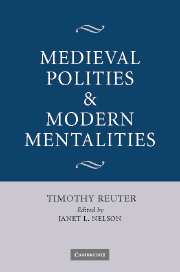Book contents
- Frontmatter
- Contents
- Editor's note
- Acknowledgements
- List of abbreviations
- Editor's introduction
- PART I MODERN MENTALITIES: HISTORIOGRAPHIES, METHODOLOGIES, PRECONCEPTIONS
- 1 Modern mentalities and medieval polities
- 2 Medieval: another tyrannous construct?
- 3 The insecurity of travel in the early and high Middle Ages: criminals, victims and their medieval and modern observers
- 4 Debating the ‘feudal revolution’
- 5 Pre-Gregorian mentalities
- 6 Whose race, whose ethnicity? Recent medievalists' discussions of identity
- PART II THE SYMBOLIC LANGUAGE OF MEDIEVAL POLITICAL ACTION
- PART III POLITICAL STRUCTURES AND INTENTIONS
- Index
1 - Modern mentalities and medieval polities
Published online by Cambridge University Press: 12 August 2009
- Frontmatter
- Contents
- Editor's note
- Acknowledgements
- List of abbreviations
- Editor's introduction
- PART I MODERN MENTALITIES: HISTORIOGRAPHIES, METHODOLOGIES, PRECONCEPTIONS
- 1 Modern mentalities and medieval polities
- 2 Medieval: another tyrannous construct?
- 3 The insecurity of travel in the early and high Middle Ages: criminals, victims and their medieval and modern observers
- 4 Debating the ‘feudal revolution’
- 5 Pre-Gregorian mentalities
- 6 Whose race, whose ethnicity? Recent medievalists' discussions of identity
- PART II THE SYMBOLIC LANGUAGE OF MEDIEVAL POLITICAL ACTION
- PART III POLITICAL STRUCTURES AND INTENTIONS
- Index
Summary
‘Today, the question “What do you do?” means “How do you earn your living?”’, wrote W. H. Auden of the successful poet's dilemma.
On my own passport I am described as a ‘Writer’; this is not embarrassing for me in dealing with the authorities, because immigration and customs officials know that some kinds of writers make lots of money. But if a stranger in the train asks me my occupation I never answer ‘writer’ for fear that he may go on to ask me what I write, and to answer ‘poetry’ would embarrass us both, for we both know that nobody can earn a living simply by writing poetry. The most satisfactory answer I have discovered, satisfactory because it withers curiosity, is to say ‘Medieval Historian’.
I don't want to wither your curiosity this evening, but in spite of my professional pride I suspect that Auden's recipe probably works. My subject has a low reputation for practical value as well. A few years ago the Ministry of Defence ran a recruiting advertisement showing a scene which was a modern version of ‘the Gatling's jammed and the colonel's dead’. The caption was ‘What Use is a Degree in Medieval History?’, and the clearly implied answer was: none whatever. The only thing to be said for it was that it gave you a Trained Mind, which would serve you well when pinned down by the Ukrainians across the valley.
- Type
- Chapter
- Information
- Medieval Polities and Modern Mentalities , pp. 3 - 18Publisher: Cambridge University PressPrint publication year: 2006

